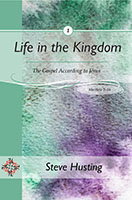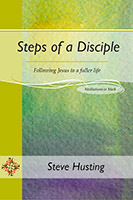Is the Old Testament (OT) of any value nowadays? Many people say that we no longer have to follow all those laws and rules anymore, so why bother reading it at all? I’ve read through the OT many times along with the NT. (I regularly read the Bible from front to back.) Here are some of the ways I’ve benefited from reading the whole Bible, and how you can be blessed by it too.
1. The NT makes more sense when you understand the OT. For instance, John the Baptist said of Jesus, “Behold! The Lamb of God who takes away the sin of the world!” (John 1:29). This doesn’t make much sense to our modern ears unless we understood the OT sacrificial system in which a lamb takes part. Remember that the early Israelite mind was saturated with the OT. So when Jesus and others spoke of religious things, they always did so with the expectation that the others will understand the reference. If I talk about my car and I say that I get 35 on the highway, I expect you to fill in the gaps, and understand that I’m referring to the 35 miles per gallon my car gets on the highway. In my car-saturated society, this is easily understood. Similarly, we need the OT to fill in the blanks in the NT.
2. Future prophetic fulfillment only makes sense if the OT is understood. The NT gives us many prophecies to come, but they are rooted in what was said in the OT. Also, when the NT Bible characters talk about prophecy, they are talking about what a prophet said in the OT. If we don’t understand the OT prophets, how will we understand the NT where it quotes that prophet? If we read only the NT, then we get only a partial glimpse of what God has in mind for our future. Without the OT, we get the NT out of context and misunderstand it.
3. Jesus is a member of the triune Godhead; what we learn about God in the OT helps us understand the trinity and the extent of Jesus’ deity. God called Himself I AM in the OT; Jesus does the same in the NT. God said He was the First and the Last in the OT, and Jesus does the same in the NT. God said He’ll be a shepherd to His people; Jesus calls Himself the Good Shepherd who gives His life for the sheep. Many, many examples can be given where God gives Himself a title and Jesus shares it in the NT. God commanded worship in the OT; Jesus accepted it in the NT. God forgave sinners; Jesus forgave sins against God – only a member of the Godhead can forgive sins committed against God. I understand Jesus better because of the OT revelation of God. Jesus’ breadth of power and majesty are all the greater as I read of Him this way in the OT.
4. Proof of Christ’s deity and His being the Messiah is found in the prophetic OT passages, then fulfilled in the NT. Many people are unconvinced that Jesus is the only one whom God sent to save us. As a result, many churchgoers believe there are many ways to God (John 14:6). Pay attention to “it is written” in Matthew’s gospel, for he is showing us how Jesus meets the OT criteria as the only God-approved Messiah and Savior of the world. Through the OT prophecies, God tells us in advance what the Messiah will do or be like so that when He came, we would be able to identify Him. Having the fuller revelation we possess, we have no reason to miss Him as the early Jews did.
5. It is only natural to read a book from cover to cover. How many books have you picked up and read in random order? How many of you read a book, but start 2/3 of the way through? Yeah – no one! Reading the Bible from front to back helps us get the flow of the gospel story, of man’s creation, fall, and redemption. The gospel news is so much greater when you see the evil in man’s heart that God had to deal with in the OT. Seeing their evil helps us see our own – and appreciate God’s grace the more.
6. I want to know as much about God as I can! The Bible is the only trustworthy source I have to get to know Him. It is the only clear way He has revealed Himself, with words that He Himself has chosen (especially in those Bible versions that are literal translations and not paraphrases). It takes time to learn of someone you love in this world because nothing about the person is set out in order. You pick up things as you go through life together. So it is with learning of God; the Bible doesn’t set things in order but spreads it all throughout the book. There’s always something new to learn with each pass through.
7. Reading the OT and NT helps me know the difference between what the Bible actually says about something versus people’s explanation of Bible truths. You wouldn’t believe how much of the theology we pick up is based on someone’s idea of God and not really the way God would have us see it. (“God helps those who help themselves” is not in the Bible – God helps those who can’t help themselves!) I get dim and misleading ideas about God from my culture; only through personal Bible reading have I been able to separate the true from the false. God’s words versus man’s words – which would you rather rely on for eternal life? On which would you want to base your faith? Which gives you a solid foundation for knowing God and life with Him?
8. It’s true that Christians don’t need to follow the OT rules regarding the priesthood and other aspects of ancient Israel. We don’t need to follow the civil laws God laid down for people to follow in the Israelite society – we follow our own nation’s laws. However, they give us a good idea of the high standards God would have His people live if they wanted a holy God to dwell in their midst. They also help us to see how far our civilization has fallen and how sin has been accepted and protected by laws enacted by men. You’ll be able to see how our society has made laws approving the exact behaviors God rejected in the OT. (We’ve picked up a lot of moral values based on our laws and society’s general behavior – “if everybody’s doing it, it must be fine.”) It helps us to examine our hearts to see whether we have strayed from His goal of union with Him in holiness. For this reason, all who are lawmakers / politicians, concerned citizens, and voters should familiarize themselves with God’s moral laws in Exodus, Leviticus, and Deuteronomy.






